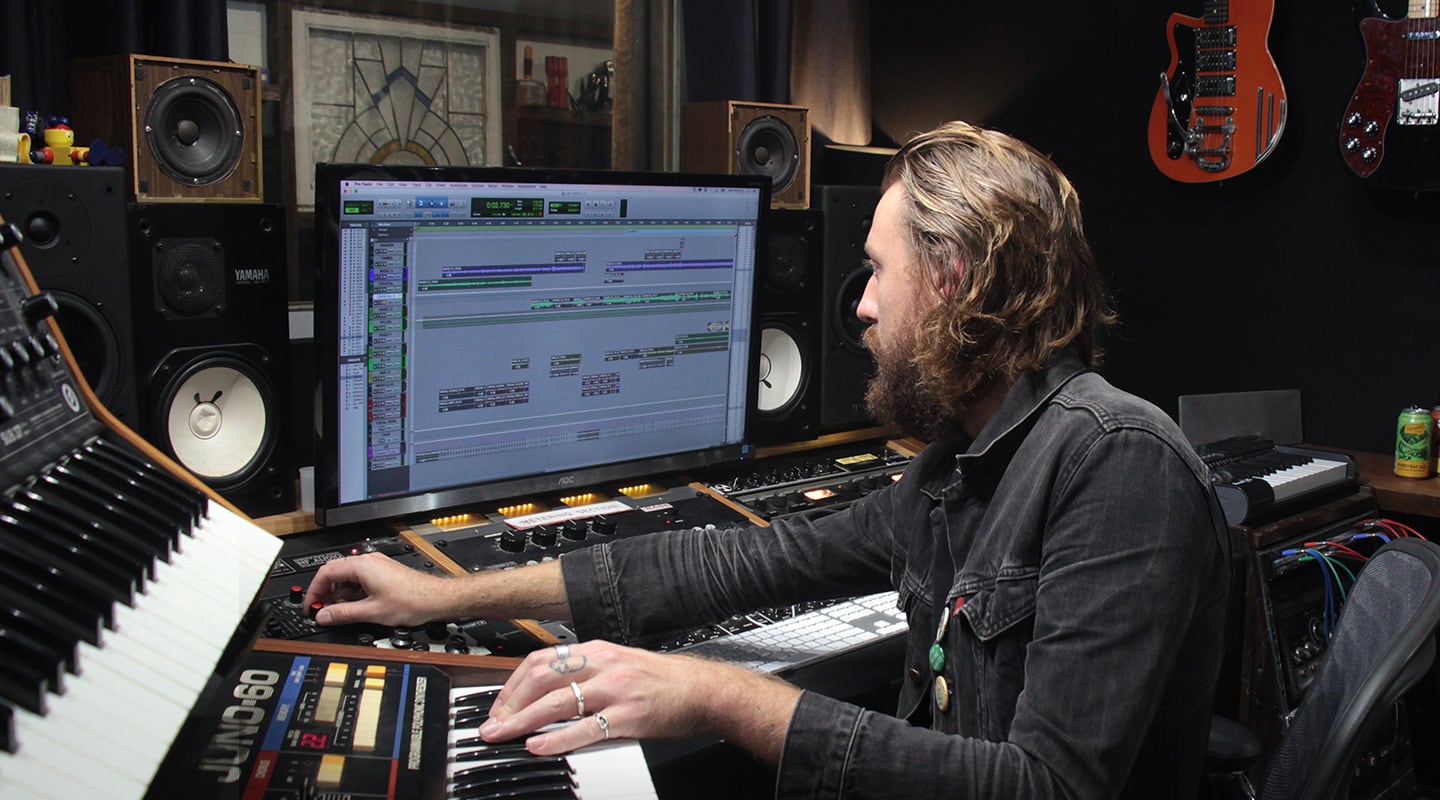
Skills to Pay the Bills: Part 2
In the second and final part of this series Nick Franklin discusses the longer-term benefits of using good bookkeeping software, how it helps him grow his business, and how it helps him plan for the future.
Tutorial: Nick Franklin
A close friend and fellow producer/engineer came to me recently confessing he wasn’t sure he could keep it up any more. The bands he’d been working with were not enjoyable, and he had the age-old problem of never having enough money when he needed it. I knew that feeling because I’ve experienced it so many times, and you probably will too — if you haven’t already. I asked him, “How much have you made so far in this financial year?” He had no idea. I asked him, “If I gave you half an hour to work it out, could you tell me?” He could not. He was similarly in the dark about how much he’d spent in this financial year.
If a producer or engineer doesn’t know how much money is coming in, how would they know how much they can spend on equipment, rent and their personal lives? The answer for a lot of people is that they don’t; they live from invoice to invoice, spend it as they make it, and scramble to get money in before the bills are due. That system doesn’t work, and it makes them unhappy. Therein lies one of the longer-term benefits of using a solid bookkeeping application: it analyses your business over time and reports to you.
ANALYSIS
I can tell you within 30 seconds how much money my business has generated this month, this quarter and this financial year. I can tell you how much I made this month compared with how much I made in the same month last year. I can tell you who my biggest clients are and by what margin, and I can tell you what my biggest expenses are. I can even tell you – with a reasonable degree of accuracy – how much tax I’ll be liable for this year. I can get all of this information without even leaving the homepage of my bookkeeping application, and without any real work on my part.
The knock-on effect of having all this information at your fingertips is that it helps you make better business decisions. If your bookkeeping app tells you that this month is always a quiet month, every year, then it’s obviously not the right time to buy that vintage Neumann you’ve had your eye on. That kind of information also helps you to prepare in advance so that you have some money in the bank for the quiet periods.
The year I began properly using bookkeeping software I estimate I had 20% more money in my back pocket at all times, even though I earned almost exactly the same as I did the year before. That’s a lot of beer and tacos you could be leaving on the table!
GROWTH
Equipped with your bookkeeping software and its analytical capabilities, you’ll soon know if your business is growing, shrinking or stagnating. In an ideal world, an amount of growth that you can handle is a best case scenario. If your business has plateaued or, worse still, is in decline, you need to ask yourself why. Engineers and producers who had their most successful years in the ’80s will be climbing over themselves at this point to tell you it’s because of the demise of the music industry, music piracy, home studios, Katy Perry, UFOs and the government. The truth is the only person responsible for the growth of your business is you. Blaming outside factors is saying you have no control, and having no control is no good.
I have a three-tiered system for ensuring that my business as a freelance music producer remains in growth. It probably won’t work for your business in this exact form, but it might help you to develop your own strategies to keep that profit/loss line moving up and to the right. No one wants to find themselves earning less when they’re 40 than they did when they were 30, but that’s the risk you run by not focussing on growth in your business.
The first tier to my system is to do everything I can to ensure that every client I work with will want to work with me again. That means working really hard on every project, and making every record count. You’re probably already doing this, unless you’ve hit that period that everyone in our industry does where you actually resent your clients. If that’s the case it’s time to wake up to yourself because if you don’t make them come back, they’re going elsewhere. Be the guy the band whines to about the last guy, not the guy they’re whining about. Be nice, be friendly, be a badass, be awesome at your job. Do that at a price that makes sense to your client and follow up with them on a regular basis, and you can be their producer for life. Win four new ‘clients for life’ a year and you’ll have more work than you can handle before you know it. The added advantage of this behaviour will be solid word-of-mouth promotion — the best kind! Pro tip: keeping clients coming back has nothing to do with gear, so stop spending!
The second tier to my system is to spend at least one hour per week doing what I call ‘business development’. That’s anything that has to do with growing my business. Sometimes it’s trawling back through my emails and social media messages to make sure I didn’t leave a lead hanging or a conversation unfinished. Sometimes it’s working on my website, or trying to develop promotions that might lead to more work. Sometimes it’s inviting someone for a coffee or a beer to chat about music, and sometimes it’s collaborating with someone free of charge in the hope of generating work down the line. Whatever it is, you have to put aside time to do it or it won’t get done. The best part about this tier is that I can do it with a TV show running in the background, a beer in my hand, or both!
The third tier to my system is developing income streams that aren’t directly related to producing and mixing bands, so that there is money coming in from elsewhere during the quiet times. For me this includes things like teaching one day a week at an audio college, building audio equipment to sell via my other business (NF Audio), and one-on-one Pro Tools lessons. Anything you can build in to your business that will remain standing while your main income streams are having a lie down for a moment is good. There’s no shame in having a side hustle.
a lot of people live from invoice to invoice, spend it as they make it, and scramble to get money in before the bills are due. That system doesn’t work
THE FUTURE
Audio professionals are notoriously bad with their personal finances and even worse with planning for their futures. Many I know have more than one microphone that cost them more than the price of a used car, but not a cent in superannuation or anything else in place for when their bodies can no longer withstand 12 hour days and six day weeks in recording studios.
For the following information, I must stress that I am not a financial advisor and you should not necessarily apply my systems without seeking advice from your accountant, financial advisor and/or lawyer.
When you’re employed in Australia your employer is legally required to invest the equivalent of 9.5% of your wage into a superannuation fund on your behalf. Those contributions cease the moment you leave the safety net of that employment and begin your life as a freelance producer/engineer, and it is then your responsibility to plan for your retirement. You aren’t legally required to make contributions to your superannuation, but no one else is going to do it for you. Retirement probably seems like a long way away, and you probably feel like you could continue being a music producer until the day you die. The reality is that one day you’ll be sick of it, or your clients will be sick of you. Starting to build your nest egg as early as possible might make the difference between retiring in a beachside house with an incredible home studio in which to tinker away the rest of your days, or living in a caravan park with not even two dollar coins to rub together. Planning for your future may not be as fun as planning to buy a new guitar, compressor or monitor speakers, but neither is stressing about your electricity bill or groceries when you’re 70. And don’t even start with “But my gear is an investment!” Pro tip: $100k invested into a low-fee index-balanced superannuation fund appreciates faster than any vintage console, microphone or electric guitar.
The thing I wish someone had explained to me when I went freelance is that if you don’t continue to make contributions to your superannuation after leaving full-time employment, not only might it stop growing, it might start shrinking – thanks to the sometimes exorbitant and arguably unethical fees and charges applied by some superannuation fund managers. If you don’t know where all of your superannuation is and how much you might have, go and find out! Google ‘find super’ and follow your nose. If you have bits of superannuation sitting around in different funds, move it all into one low-fee low-cost account, start adding your own contributions, and watch it grow.
FINANCE FRIDAYS
To keep my personal and future finances in check I’ve developed my own system that I call ‘Finance Fridays’ (very nerdy, I know), which I implement each and every week. It takes me about 15 minutes.
Every Friday morning I sit down with a coffee and sort out my finances for the week. First, I total the amount of income the business generated in the last seven days and I immediately transfer 9.5% of that to my superannuation fund; just like an employer would do. Second, I take a percentage of the week’s earnings (calculated based on my tax obligations) and transfer that into an account linked to my business account that is specifically for tax savings. Come tax time, there is usually enough in that account to pay my tax bill immediately. Finally, I move around 70% of what’s left to my personal bank account for my life expenses: savings, beer money, rent at home, and the rest. The amount that remains in the business account is for business-related expenses, such as the studio rent and equipment purchases.
With this system I know I’m planning for my future, I know how much I’m allowed to spend that week, and I know that the studio bills will always be covered.
My specific system may not work for your circumstances, but that’s not the point. The take-away from all of this is that if you’re not dedicating some actual time and effort to the way your money comes in and goes out of your business then I doubt you’re setting yourself up for success in the future.
DO IT YOURSELF!
So there you have it. Over the last two issues I’ve described what I consider to be the bare minimum any freelance producer/engineer should know when running a small business. You could (and probably should!) dig deeper, research further and develop an understanding of business that positions you for success. While not as fun or sexy as reading about the newest plug-in or compressor, time invested in yourself and your business will give back 10 times as much in the long run. So take my advice and develop your own systems of money management. It actually makes your life easier, and you may even come to enjoy it!























RESPONSES